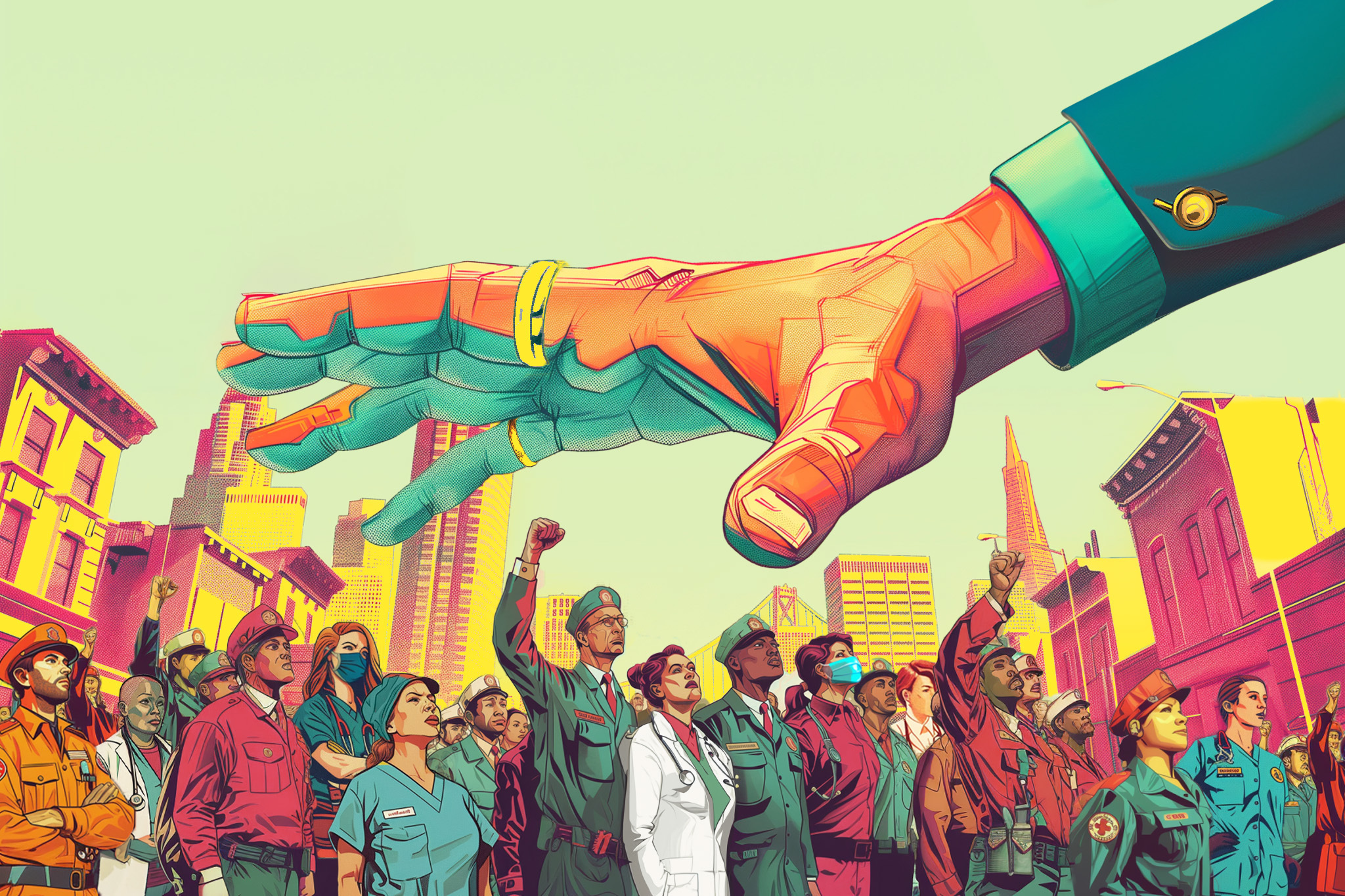In a recent opinion piece, Rhode Island resident and former San Francisco policy aide Andrew Mullan claims that the city’s health care workers, 911 dispatchers, street cleaners, airport janitors and librarians are to blame for the city’s projected $800 million budget deficit. He wants you to scapegoat us. Don’t fall for it.
Mullan’s cynical arguments are the same ones San Francisco’s big-business lobbying groups trot out every time San Francisco runs a budget deficit. Like arsonists who set fire to a building and then wait around to tell firefighters how to fight the blaze, these so-called “fiscal watchdogs” spent the last two decades fighting for lower taxes on themselves. Now, they want to blame the subsequent budget deficits on front-line public servants trying to scrape by in one of the world’s most expensive and unequal cities.
This is personal to me as a registered nurse at San Francisco General Hospital for the past 15 years. We showed up every day through the pandemic to keep our patients alive and healthy. We were doing the impossible in impossible conditions. In 2024, little has changed. General Hospital is the only Level I trauma center in San Francisco; in December 2023, we had to divert patients to other hospitals 60% of the time, partly due to inadequate staffing.
The city saved $23 million by keeping vacant positions open last year on nurses alone. But to keep the hospitals up to standards, the San Francisco Department of Public Health brings in travel nurses—contractors who often fly in from other states, aren’t prepared for our patients, spend their earnings elsewhere and cost the city far more than full-time local hires. In its $85.6 million contract with Cross Country Staffing, San Francisco will spend 14% more than it would cost to fill those vacant positions with permanent, full-time nurses through 2024.
Nurses are hardly the only city workers struggling with an understaffing crisis. When you’re put on hold on 911, or the streets are dirty in front of your home or business, or you want people struggling with addiction and homelessness to get the help they need, remember there are 3,700 vacant permanent jobs in city government. This is in part because it takes a glacial 255 days to fill a single position. It’s tough to solve San Francisco’s biggest problems with a 40% vacancy rate for 911 dispatchers, a 22% vacancy rate in the Department of Public Works and big shortages of homeless outreach and social workers.
But instead of staffing up, we’re contracting out—with higher costs and poor results. The pandemic—and the skyrocketing inflation and tight labor market it created—fueled an explosion of turnover in the most physically, mentally and emotionally taxing public jobs. The city now often struggles to compete for the best front-line workers against private companies with streamlined hiring processes offering higher wages.
Curiously, Mullan doesn’t blame the city’s deficit on the increasing share of the city budget going to private contractors. The city has spent an average of $5.2 billion annually on outside contracts since fiscal year 2017-2018. A decade ago, public personnel made up 51% of the city’s budget. Today, that has dropped to 46% as spending on outsourcing services has increased.
According to data on the city’s supplier contracts database, 94% of contract awards go to firms with no roots in San Francisco, effectively siphoning tax money out of our local economy. Since 2017, $41 billion has been awarded to contractors outside the city.
The results are not encouraging. Stories of lax oversight and poor management in San Francisco’s contracting binge now pepper local headlines: kickback schemes, lavish spending by executives, corruption—the list goes on.
And City Hall’s deficit forecast assumes built-in inflation adjustments for all of these contractors—regardless of whether they are actually providing quality service or making a dent in the problems they’re hired to solve. Even so, less than 6% of the mayor’s proposed budget cuts target the city’s army of contractors, while more than $700 million is achieved by leaving open vacant jobs for actual city workers.
We won’t solve San Francisco’s biggest problems by cutting vital services, leaving unfilled front-line positions, or worse, outsourcing them at higher costs to unaccountable out-of-town contractors. To fix our city, we need to cut wasteful contracts and staff up the departments that keep San Francisco running.
Norlissa M. Cooper, Ph.D., M.S.N., B.S.N., R.N., is a registered nurse at San Francisco General Hospital. She has over 15 years of experience in acute care as a staff nurse, charge nurse, nurse educator and continuing education committee co-chair.
